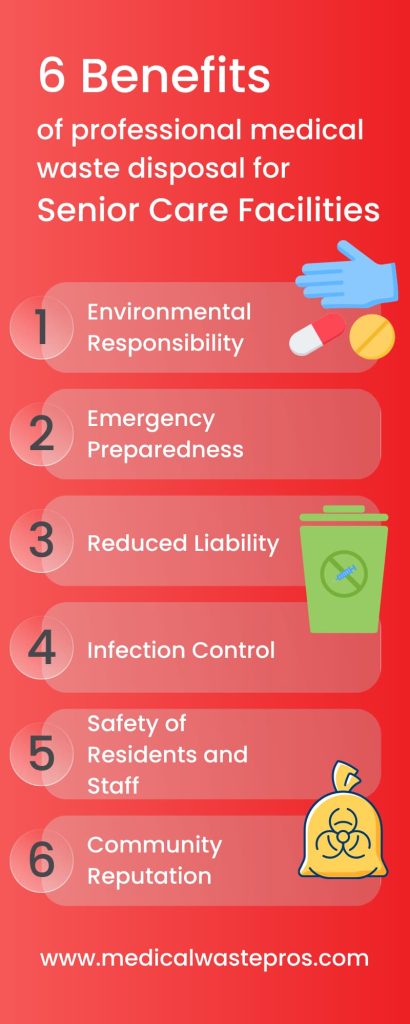As the management of a senior care facility, ensuring the proper disposal of medical waste is not only a legal requirement but also crucial for maintaining a safe and hygienic environment for residents, staff, and visitors. Medical Waste Pros understands the unique challenges faced by senior care facilities and aims to provide guidance on best practices for medical waste disposal. Our team is experienced in advising businesses in finding affordable, secure medical waste disposal solutions near them.
Medical Waste Pros knows about secure disposal for sharps, pharmaceuticals, expired equipment, regulated waste, hazardous waste, and more–at any frequency. It is likely that your long-term care facility may need regularly scheduled pick up services for many different types of waste. Our experts can assist you in finding the appropriate schedule for your needs.

Long Term Care Waste Disposal Considerations
Here are some considerations when finding medical waste disposal services for your senior care facility.
Handling Medical Waste
The handling of medical waste is regulated by local, state, and federal governments. Many of these regulations are important for facility owners to educate staff on. Conducting regular training sessions for staff members involved in waste handling and disposal. Ensure they are familiar with relevant regulations such as OSHA’s Bloodborne Pathogens Standard and EPA guidelines for pharmaceutical waste disposal. Compliance with these regulations is essential to avoid penalties and protect community safety. Creating a culture around compliance is an important aspect of ensuring safety within a workplace.
Segregating and identifying waste generated at a senior care facility is an important step in creating a waste management plan. Medical Waste Pros’ trusted partners can help you implement a comprehensive waste segregation system to separate medical waste from general waste. Use color-coded bins and labels to clearly identify different types of waste, including sharps, infectious materials, pharmaceuticals, and non-hazardous waste.
Proper packaging and storage of senior care waste is important when creating a medical waste disposal plan for a facility. Use leak-proof and puncture-resistant containers for collecting and storing medical waste. Secure lids tightly, and avoid overfilling containers to prevent spills and contamination risks. Storing waste in designated spots away from resident and visitor areas is critical to this.
Compliance Processes
An important aspect of medical waste management for large facilities involves paperwork. Maintain accurate records of waste generation, disposal, and training activities as part of your facility’s compliance efforts. Keep track of waste manifests, disposal certificates, and training logs for auditing purposes. Conducting routine audits and inspections of waste management practices within your facility to identify areas for improvement and ensure ongoing compliance with regulations is often recommended when complying with facility guidelines. Address any issues promptly to maintain a safe environment.
Working with reputable medical waste disposal connectors like Medical Waste Pros is an easy way to boost compliant and efficient waste management. We are part of a nationwide network of partners whose services can provide appropriate containers, scheduled pickups, and proper disposal methods for different types of medical waste. Instead of attempting to find a provider in your area for every need that is affordable and compliant on your own, Medical Waste Pros helps you to find the best solution for your facility.
Disposal by Waste Type:
Sharps Waste: Sharps, such as needles and lancets, require special handling and disposal. This is due to their potential to cause injuries and transmit infections. Provide puncture-resistant sharps containers in areas where sharps are used, and ensure they are properly sealed and labeled for disposal.
Pharmaceutical Waste: Develop protocols for the safe disposal of expired or unused medications to prevent environmental contamination and unauthorized access. Utilize pharmaceutical waste disposal services to collect and dispose of these substances according to regulations.
Hazardous Waste: EPA regulatory guidelines define hazardous waste as any solid, liquid, or contained gaseous material that is no longer being used and is recycled, stored, or thrown away.
Controlled Substances: Schedule I-V drugs require secure disposal, especially in large quantities. Controlled substances are drugs that require strict regulation based on their potential for abuse or dependence. Having procedures in place for the disposal of a controlled substance minimizes the risks associated with addiction and environmental impact.
Infectious Waste: Infectious waste encompasses a broad range of materials contaminated with pathogens. This includes blood, sharps, tissues, cultures, and other potentially hazardous materials. Improper disposal of these materials can lead to the transmission of infectious diseases. These include HIV, hepatitis B and C, and other serious illnesses.
Benefits of Compliant Disposal

There are a variety of benefits to your community, individuals, and your senior care facility when a comprehensive, secure medical waste disposal plan is put in place.
Environmental Responsibility: Emphasize environmentally responsible waste management practices, such as recycling whenever possible and using eco-friendly disposal methods. Partner with waste disposal services that prioritize sustainability and proper waste treatment.
Emergency Preparedness: Develop and communicate emergency procedures for managing spills, accidents, or other waste-related incidents promptly and effectively. Ensure staff members are trained in emergency response protocols to mitigate risks.
Infection Control: Senior care facilities often cater to individuals with compromised immune systems or underlying health conditions. Proper medical waste disposal, including segregation, packaging, and disposal according to regulations, helps prevent the spread of infections. It also reduces the risk of healthcare-associated infections (HAIs) among residents and staff.
Safety of Residents and Staff: Sharp objects like needles, lancets, and other medical instruments pose significant safety risks if not disposed of properly. Using puncture-resistant containers and following disposal protocols minimizes the chances of accidental needlesticks or injuries, protecting both residents and healthcare workers.
Community Reputation: Maintaining high standards of medical waste management reflects positively on the reputation of senior care facilities within the community and among stakeholders. It demonstrates a commitment to safety, hygiene, and ethical practices, which are important considerations for families choosing care facilities for their loved ones.
Reduced Liability: Implementing proper medical waste disposal practices reduces the facility’s liability risks. These are associated with accidents, injuries, or environmental violations related to waste management. This proactive approach protects the facility’s financial and legal interests while prioritizing safety and compliance.
Find Solutions with Medical Waste Pros
Our experts at Medical Waste Pros are equipped to match your senior care facility with secure disposal solutions for all of your needs. Find a comprehensive plan for the disposal of pharmaceuticals, sharps, regulated waste, hazardous waste, expired equipment, and more–at any frequency. To get free, no-obligation quotes in just minutes, fill out the form or call Medical Waste Pros at (888) 755-6370.







